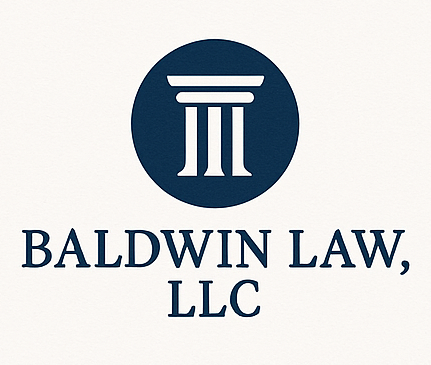Corporation vs. LLC: Choosing the Right Business Structure for Your Venture
At Baldwin Law, LLC, we often assist entrepreneurs in making crucial decisions about their business structure. Two popular options are corporations and Limited Liability Companies (LLCs). In this post, we'll explore how to start each type of entity, their key differences, and factors to consider when choosing between them.
Starting a Corporation or LLC
The process of forming a corporation or LLC is similar in many ways:
Choose a unique business name
File formation documents with the state (Articles of Incorporation for corporations, Articles of Organization for LLCs)
Create governing documents (Bylaws for corporations, Operating Agreement for LLCs)
Obtain necessary licenses and permits
Apply for an Employer Identification Number (EIN) from the IRS
Key Differences Between Corporations and LLCs
While both entities offer personal liability protection, there are significant differences:
Ownership Structure:
Corporations have shareholders, directors, and officers
LLCs have members (and managers in manager-managed LLCs)
Management:
Corporations have a more rigid management structure
LLCs offer more flexibility in management arrangements
Taxation:
Corporations are typically subject to double taxation (corporate and personal level)
LLCs have pass-through taxation by default, but can elect corporate taxation
Compliance Requirements:
Corporations generally have more formal requirements (regular meetings, minute-keeping)
LLCs typically have fewer ongoing formalities
Investment Potential:
Corporations can easily issue stock to attract investors
LLCs can be less attractive to outside investors due to their structure
Reasons to Choose a Corporation
Planning to go public or attract significant outside investment
Desire for a familiar, traditional business structure
Need for a clear hierarchy and defined roles
Intention to offer employee stock options
Reasons to Choose an LLC
Seeking simplicity in formation and ongoing management
Desire for pass-through taxation
Need for flexibility in profit distribution and management structure
Operating in a high-risk industry where asset protection is crucial
Factors to Consider
When deciding between a corporation and an LLC, consider:
Your long-term business goals
The desired management structure
Tax implications for your specific situation
The level of formality and compliance you're comfortable maintaining
Your industry and potential liability concerns
At Baldwin Law, LLC, we understand that choosing the right business structure is a critical decision that can have long-lasting implications for your venture. While this post provides a general overview, the best choice for your business will depend on your specific circumstances, goals, and jurisdiction.
We recommend consulting with an experienced business attorney to discuss your unique situation and determine the most advantageous structure for your business. Our team is here to guide you through the formation process and ensure your business starts on solid legal footing.
Remember, the right business structure can provide a strong foundation for your company's growth and success. Take the time to make an informed decision, and don't hesitate to seek professional advice to set your business up for long-term prosperity.
